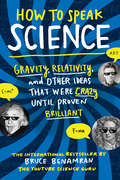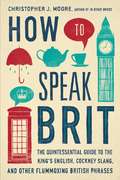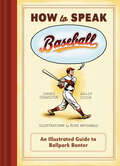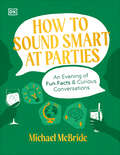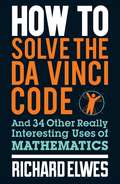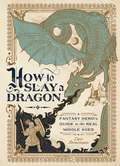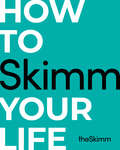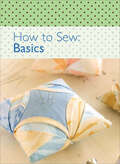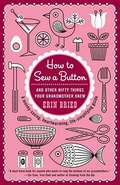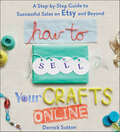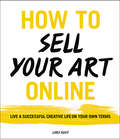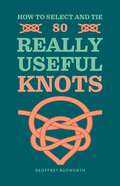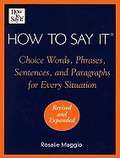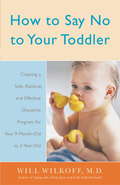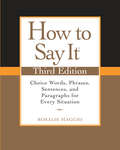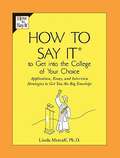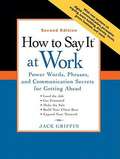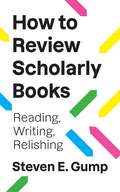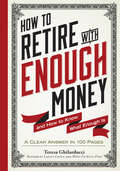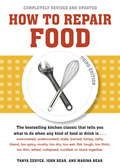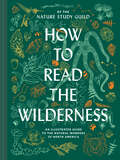- Table View
- List View
How to Speak Science: Gravity, Relativity, and Other Ideas That Were Crazy Until Proven Brilliant
by Bruce BenamranAs smartphones, supercomputers, supercolliders, and AI propel us into an ever more unfamiliar future, How to Speak Science takes us on a rollicking historical tour of the greatest discoveries and ideas that make today’s cutting–edge technologies possible. Wanting everyone to be able to “speak” science, YouTube science guru Bruce Benamran explains–as accessibly and wittily as in his acclaimed videos–the fundamental ideas of the physical world: matter, life, the solar system, light, electromagnetism, thermodynamics, special and general relativity, and much more. Along the way, Benamran guides us through the wildest hypotheses and most ingenious ideas of Galileo, Newton, Curie, Einstein, and science’s other greatest minds, reminding us that while they weren’t always exactly right, they were always curious. How to Speak Science acquaints us not only with what scientists know, but how they think, so that each of us can reason like a physicist–and appreciate the world in all its beautiful chaos.
How to Speak Brit: The Quintessential Guide to the King's English, Cockney Slang, and Other Flummoxing British Phrases
by Christopher J. MooreThe quintessential A to Z guide to British English--perfect for every egghead and bluestocking looking to conquer the language barrier Oscar Wilde once said the Brits have "everything in common with America nowadays except, of course, language." Any visitor to Old Blighty can sympathize with Mr. Wilde. After all, even fluent English speakers can be at sixes and sevens when told to pick up the "dog and bone" or "head to the loo," so they can "spend a penny." Wherever did these peculiar expressions come from? British author Christopher J. Moore made a name for himself on this side of the pond with the sleeper success of his previous book, In Other Words. Now, Moore draws on history, literature, pop culture, and his own heritage to explore the phrases that most embody the British character. He traces the linguistic influence of writers from Chaucer to Shakespeare and Dickens to Wodehouse, and unravels the complexity Brits manage to imbue in seemingly innocuous phrases like "All right." Along the way, Moore reveals the uniquely British origins of some of the English language's more curious sayings. For example: Who is Bob and how did he become your uncle? Why do we refer to powerless politicians as "lame ducks"? How did "posh" become such a stylish word? Part language guide, part cultural study, How to Speak Brit is the perfect addition to every Anglophile's library and an entertaining primer that will charm the linguistic-minded legions.
How to Speak Baseball: An Illustrated Guide to Ballpark Banter
by Sally Cook James Charlton“An elegantly designed little book . . . capturing the colorful, frequently fanciful vocabulary that describes the world of baseball.” —The Litchfield County TimesThis handsome guide to the language of baseball decodes the amusing, clever phrases that pepper commentary about the sport. Packed with witty explanations of everything from “duster” and “rubber arm” to “up the elevator,” this ballpark lexicon plays on a nostalgic love for the national pastime while covering ground from baseball’s beginnings to today. This humorous mix of definitions and anecdotes is the perfect gift for both lifelong baseball fans and rookies “working up the ranks.”“If you happen to be watching or listening to a game, do you wonder what the announcer means by ‘the neighborhood play,’ ‘can of corn’ or ‘golden sombrero?’ How to Speak Baseball: An Illustrated Guide to Ballpark Banter, by James Charlton and Sally Cook, is an informative, entertaining read. The authors have compiled a list of obscure, old and newer baseball terms from ‘ace’ to ‘you can’t walk off the island.’” —Daily Pilot
How to Sound Smart at Parties: An Evening of Fun Facts & Curious Conversations
by Michael McBrideWelcome to the most interesting dinner party you&’ve ever attended!Join seven friends for an evening of trivia, myth-busting, and camaraderie. You'll have a front row seat at the party, listening in to the early small talk—where light and fun ideas are discussed (&“Did you know astronauts have Velcro on the inside of their helmets to scratch their noses?&”)—to the end of the night, when conversations get deeper. (&“Did the popularization of drinking coffee lead to modern democracies?&”)Packed with over 150 fun facts spanning the topics of ancient civilizations, animal behavior, natural science, outer space, human accomplishments, pop culture, and more, How to Sound Smart at Parties ensures you&’ll always have something clever to contribute to the conversation.
How to Solve the Da Vinci Code
by Richard ElwesCan you outrun a bullet? How do you build an electronic brain? Could you slow down time? How do you unleash chaos? From Plato's classification of regular polyhedra to making a million on the stock market, How to Solve the Da Vinci Code gives you everything you need to understand how numbers work, and the impact they have on our lives every day.
How to Slay a Dragon: A Fantasy Hero's Guide to the Real Middle Ages
by Cait StevensonGrab your magical sword and take the place of your favorite fantasy character with this fun and historically accurate how-to guide to solving epic quests.What should you ask a magic mirror? How do you outwit a genie? Where should you dig for buried treasure? Fantasy media&’s favorite clichés get new life from How to Slay a Dragon: A Fantasy Hero&’s Guide to the Real Middle Ages, a historically accurate romp through the medieval world. Each entry presents a trope from video games, books, movies, or TV—such as saving the princess or training a wizard—as a problem for you to solve, as if you were the hero of your own fantasy quest. Through facts sourced from a rich foundation of medieval sources, you will learn how your magical problems were solved by people in the actual Middle Ages. Divided into thematic subsections based on typical stages in a fantastical epic, and inclusive of race, gender, and continent, How to Slay a Dragon is perfect if you&’re curious to learn more about the time period that inspired some of your favorite magical worlds or longing to know what it would be like to be the hero of your own mythical adventure.
How to Skimm Your Life
by The SkimmIt might seem like everyone you know took secret classes on budgeting, owning their career, and choosing the right wine—and you were sick that day. Enter: How to Skimm Your Life.With theSkimm’s trademark mix of real talk, humor, and inspirational messaging, this book gives you the information you need to make informed and empowered decisions in your life. Covering everything from personal finance, to career, to stress management, global politics, and more, How to Skimm Your Life breaks down some of the less glamorous parts of adulting and answers questions like:• “What’s the difference between an ETF and a mutual fund?”• “How should I negotiate my salary when I’m offered a new job?”• “Should I claim standard or itemized deductions on my taxes?”• “How should I tip while traveling abroad?”• “How do I read the wine list without breaking out a dictionary?”And much more . . . Wine & Food • Travel • Networking • Job Searching • Personal Growth • Mental Health • Time Management • Budgeting • Investing • Health Insurance • International Relations • US Government With life hacks for anyone who’s starting out in the real world, looking to make a change, or just wants a reset, How to Skimm Your Life will be time well spent—making it the perfect gift for graduation, birthdays, or your best friend “just because.”
How to Shop for Free: Shopping Secrets for Smart Women Who Love to Get Something for Nothing
by Kathy SpencerFor fashionistas and carpool moms alike: a veteran super-shopperOCOs secrets for finding insider deals and working the coupons and promotions to get much of their shopping lists for free
How to Sew: Basics
by The Editors of David & CharlesA brief introduction to the basics of sewing, perfect for beginners or advanced sewers interested in a refresher.This brilliant little guide covers all the essential basics of sewing, including how to choose the best fabrics and threads for projects, in clear and simple points. Learn skills in amazing sewing crafts such as cross-stitch, patchwork and quilting. This book provides all you need to know to start your own projects today, including indispensable advice for inserting zips and making and using bias bindings.
How to Sew a Button: And Other Nifty Things Your Grandmother Knew
by Erin BriedPractical and empowering, "How to Sew a Button" offers more than 100 step-by-step essential tips for cooking, cleaning, gardening, and entertaining.
How to Set a Table: Inspiration, Ideas, and Etiquette for Hosting Friends and Family
by PotterThis hip, fabric-covered guide includes creative ways to style a table--whether for a sit-down dinner, cocktail party, brunch buffet, picnic in the park, and other fun get-togethersWhether you live in a small apartment or sprawling suburban kitchen, How to Set a Table features stylish, modern ideas for welcoming family and friends in your home. This gift book, wrapped in a pretty, printed fabric, serves as a practical step-by-step guide to entertaining--with extra information on etiquette, place setting basics, centerpieces, mixing and matching, essential glassware, and napkin folds. With unexpected ideas for using all the great tableware you can find at flea markets, chain stores, or around the house, How to Set a Table updates a classic topic for a new generation of hosts.
How to Sell Your Crafts Online: A Step-by-Step Guide to Successful Sales on Etsy and Beyond
by Derrick SuttonWith over 400,000 sellers on Etsy, how can you make YOUR shop stand out and increase your sales? This is a key question for many crafters and artists who are selling online these days. Now here are all the answers and much more from author and Etsy seller Derrick Sutton.Based on Sutton's self-published guide, and drawn from his practical experience, you will learn how to boost your Etsy sales, attract more customers, and expand your online presence. He shares his proven online sales and marketing knowledge in an easily accessible format, complete with simple actions steps at the end of each chapter. Learn how to completely optimize your Etsy shop, website, or blog, and much more.Some of the topics covered include:-How to design a catchy Etsy banner-How to gain an instant analysis of your shop and where you need to focus your efforts-A crash course on photographing your items and key mistakes to avoid class-Fail-safe copywriting secrets-How to take advantage of Etsy's forums, Treasury, and more-The effective way to use Facebook and Twitter, and why so many people get it wrongA perfect gift for entrepreneurial artists, How to Sell Your Crafts Online offers crafters practical internet marketing techniques from an experienced Etsy seller that will pave the way for a profitable online business!Praise for Derrick Sutton's e-Guide Crafting Success:"This is really a great guide through the mind-boggling thicket of internet selling. It's so easy to follow and straight forward…" --- Etsy seller jenniferwhitmer"I definitely saw a difference in my sales after doing many of the things suggested."--- Etsy seller mishmishmarket"A true wealth of useful information." --- Etsy seller helixelemental"[The steps are] easily presented, so making changes to your shop can be done instantly as you are reading." -- Licky Drake, HappyGoLicky Custom Silver Jewelry"A tremendous amount of information. I learned more from [this book] than from anything I have purchased in five years." --- Etsy seller HandpaintedGifts
How to Sell Your Art Online: Live a Successful Creative Life on Your Own Terms
by Cory HuffAn essential guide for artist that teaches them how to skip the gallery system, find their niche, and connect directly with collectors to profitably sell their art.For years, galleries have acted as gatekeeper separating artists and collectors. But with the explosion of the Internet, a new generation of savvy, independent artists is connecting with buyers and making a substantial living doing what they love.How to Sell Your Art Online shows any artist how to make a successful living from their work. Cory Huff dispels the myth of the starving artist and provides the effective business strategies necessary to make artistic creations pay. He helps individual artists find their niche; outlines the elements essential for an effective website; and provides invaluable advice on e-mail marketing, blogging, social media marketing, and paid advertising--explaining how to tie all these online activities into offline success.Most importantly, he shares the secret to overcoming the biggest challenge artists face when self-marketing: learning how to tell their unique stories. Every artist has a reason for making art, but can't always find the right way to express it. Huff provides exercises artists can use to clarify the intellectual and emotional process behind their art, and teaches them how turn that knowledge into stories they can tell online and in person--and expand their reach through blogs and social media to build their art business.Drawing from the stories of successful artists, thoroughly describing how art is sold today, and providing tips on how to build connections personally and electronically, How to Sell Your Art Online illustrates the countless ways artists can take control of their creative careers--and sell their work without selling out.
How to Select and Tie 80 Really Useful Knots
by Geoffrey BudworthKnowing how to tie knots can help you in everything from work around the home, camping and fishing trips, and even art and craft projects. This is a comprehensive guide to 80 of the most useful knots for:- Sailing- Camping- Climbing and abseiling- Home and garden- Fishing and outdoor pursuitsHow to Select and Tie 80 Really Useful Knots contains an explanation of the basic terms used relating to knots and ropes, and cordage. From the rolling hitch to the boa knot, every knot is accompanied by clear step-by-step instructions and illustrations, making this a resource you'll turn to time and time again.As well as a comprehensive glossary that explains many common terms, there's an introduction to knots and ropes, cordage, and a potted history of each of the knots.
How to Select and Tie 80 Really Useful Knots
by Geoffrey BudworthKnowing how to tie knots can help you in everything from work around the home, camping and fishing trips, and even art and craft projects. This is a comprehensive guide to 80 of the most useful knots for:- Sailing- Camping- Climbing and abseiling- Home and garden- Fishing and outdoor pursuitsHow to Select and Tie 80 Really Useful Knots contains an explanation of the basic terms used relating to knots and ropes, and cordage. From the rolling hitch to the boa knot, every knot is accompanied by clear step-by-step instructions and illustrations, making this a resource you'll turn to time and time again.As well as a comprehensive glossary that explains many common terms, there's an introduction to knots and ropes, cordage, and a potted history of each of the knots.
How to Say it®
by Rosalie MaggioProviding quick and succinct solutions to the most common writing problems, this perfect companion to the "How to Say It" series gives readers all the information they need to write powerful and persuasive prose.
How to Say No to Your Toddler: Creating a Safe, Rational, and Effective Discipline Program for Your 9-Month to 3-Year Old
by William WilkoffTeaching your toddler that “no means no” now can save you both suffering. But how do you say it so that he’ll understand?For many parents of toddlers, saying “no” over and over becomes a mantra for exhaustion. Why is it so difficult to convey the meaning of this tiny word? Because, says pediatrician Will Wilkoff, when it comes to tots, actions speak louder than words. Using very direct and simple guidelines, Dr. Wilkoff shows you how to develop a consistent and effective discipline plan. He explains what can go wrong with time-out and how to overcome obstacles, including your child’s rebelliousness, physical space issues, and your own reluctance. He also presents helpful advice for special situations, such as how to say no at meal times, at grandma’s house, and when your child is sick. Presenting his compassionate and practical approach, Dr. Wilkoff shows how you can respond to the misbehavior of very young children while teaching them self-control that will benefit them throughout their lives. How to Say No to Your Toddler is the ideal guide for any parent who wants to take a more effective approach for raising healthy, happy children.
How to Say It, Third Edition
by Rosalie Maggio"For anyone who has ever stared at a blank page or screen"(Kaylene Weiser, organized consultant, The Wiser Way)- the revised third edition of the bestseller that offers "a crisp, elegant way to say everything. "(Vivian Jenkins Nelson, founder, The International Institute for Interracial Interaction) The "exceptional, wonderful, amazing"(Vivian Jenkins Nelson, founder, The International Institute for Interracial Interaction) book that has sold nearly one million copies!How to Say It® provides clear and practical guidance for what to say-and what not to say-in any situation. Covering everything from business correspondence to personal letters, this is the perfect desk reference for anyone who often finds themselves struggling to find those perfect words for:* Apologies and sympathy letters* Letters to the editor* Cover letters* Fundraising requests* Social correspondence, including invitations and AnnouncementsThis new edition features expanded advice for personal and business emails, blogs, and international communication.
How to Say It, Third Edition
by Rosalie Maggio?For anyone who has ever stared at a blank page or screen?(Kaylene Weiser, organized consultant, The Wiser Way)? the revised third edition of the bestseller that offers ?a crisp, elegant way to say everything.?(Vivian Jenkins Nelson, founder, The International Institute for Interracial Interaction) The ?exceptional, wonderful, amazing?(Vivian Jenkins Nelson, founder, The International Institute for Interracial Interaction) book that has sold nearly one million copies!How to Say It® provides clear and practical guidance for what to say?and what not to say?in any situation. Covering everything from business correspondence to personal letters, this is the perfect desk reference for anyone who often finds themselves struggling to find those perfect words for: ? Apologies and sympathy letters ? Letters to the editor ? Cover letters ? Fundraising requests ? Social correspondence, including invitations and Announcements This new edition features expanded advice for personal and business emails, blogs, and international communication.
How to Say It to Get Into the College of Your Choice
by Linda MetcalfThe latest in the How to Say It(r) series demystifies the omplex college admissions process. How to Say It(r) to Get Into the College of Your Choice offers students-as well as their parents and school counselors-a variety of essential resources and information, including: - Worksheets for writing personal statements and resumes - Winning words and phrases for filling out a sample Common Application used by more than 200 of the top colleges - Finding the right words for the admissions essay-using advice from admissions directors at top schools - Pointers for the essay portion of the New SAT- plus a practice test - The fundamentals of obtaining winning recommendations - Statements to make interviews successful .
How to Say It at Work, Second Edition
by Jack GriffinA fully revised edition of the bestselling communication tool.This revised edition includes new advice on the latest developments in the workplace since the book?s initial publication ten years ago. Along with a new chapter on digital communication, each original chapter includes a discussion of topics such as diversity issues, team building, green business, and more. In addition, the revision includes a new chapter on the art of the effective argument, with a step-by step emphasis on building a persuasive case and acquiring the skills necessary for disagreeing without being disagreeable.
How to Review Scholarly Books: Reading, Writing, Relishing (Skills for Scholars)
by Steven E. GumpA guide to the art of reviewing scholarly books, with strategies and suggestionsScholarly book reviews should be enjoyable—both to write and to read. All too often, though, they offer little more than chapter-by-chapter summaries. In this comprehensive handbook, Steven Gump offers an encouraging guide to crafting valuable reviews of scholarly books in the humanities and social sciences. Readers learn how to write engaging, respectful reviews that make intellectual contributions of their own. With extensive experience in both writing and editing scholarly book reviews, Gump walks prospective reviewers through the process of selecting a book to review, identifying a venue to publish the review, reading and annotating the book, and writing a review that is tailored to the audience of the target venue, with the possibility of dissemination to popular outlets beyond the core field.Alongside this practical advice, Gump offers a generous philosophy of scholarly book reviewing that considers the roles of book reviews and the responsibilities of book reviewers within the broader scholarly ecosystem. Readers learn how to uplift the voices and contributions of authors, how to prepare the next generation of reviewers (including undergraduates or graduate students), and how to elevate an unjustly underestimated genre. Ultimately, this essential guide brings into renewed focus the joys of reading scholarly works, engaging with intellectual ideas, and writing incisively.
How to Retire with Enough Money: And How to Know What Enough Is
by Teresa GhilarducciHere is a single-sit read than can change the course of your retirement. Written by Dr. Teresa Ghilarducci, an economics professor, a retirement and savings specialist, and a trustee to two retiree health-care trusts worth over $54 billion, How to Retire with Enough Money cuts through the confusion, misinformation, and bad policy-making that keeps us spending or saving poorly. It begins with acknowledging what a person or household actually needs to have saved—the rule of thumb is eight to ten times your annual salary before retirement—and how much to expect from Social Security. And then it delivers the basic principles that will make the money grow, including a dozen good ideas to get current expenses under control. Why to “get rid of your guy”—those for-fee (or hidden-fee) financial planners that suck up valuable assets. Why it’s always better to pay off a loan or a mortgage. There are no gimmicks, no magical thinking—just an easy-to-follow program that works.
How to Repair Food
by John Bear Tanya Zeryck Marina BearTHE BEST-LAID PLANS OFTEN GO AWRY ... especially in the kitchen. When you're faced with one of those inevitable cooking calamities--be it a sinking souffle, salty soup, or stuck-together pasta--How to Repair Food has the answers and advice you need to get your meal back on track. First published in 1970 and now with more than 100,000 copies in print, this kitchen classic has been completely revised and updated to serve a new generation of home cooks. NEW TO THE THIRD EDITION: " Hints on lowering fat and sodium. " Ways to integrate wholesome and organic ingredients. " Tips for reducing kitchen waste. " Ideas for coping with holiday and other special-occasion dinner debacles. Filled with witty, accessible, and often ingenious solutions to mishaps that befall even the best of cooks, the alphabetical listings (from Abalone to Zucchini) are designed to rescue any dish from the brink of disaster.
How to Read the Wilderness: An Illustrated Guide to North American Flora and Fauna
by Nature Study GuildThis book invites you to see the natural world in all its intricacy and intense beauty and become a knowledgeable steward of the wild.From the mountains to the ocean shores, from the wetlands to the deserts, North America teems with flora and fauna in delicately balanced ecosystems found nowhere else on Earth. With this book in hand, you will understand the language of nature and see those wild places with new eyes. You'll learn to recognize the lobed leaf of an Oracle Oak, the webbed tracks of a River Otter, and the fine, cream-colored tentacles of a Frilled Anemone. This volume celebrates a tradition of knowledge established by the Nature Study Guild. For more than sixty years, the Guild's pocket guidebooks have helped hikers, campers, foragers, and explorers navigate the great outdoors. Now, the best of the guides' informative text and iconic illustrations are gathered in one handsome hardcover: the perfect reference for today's ramblers.FOR NATURE LOVERS OLD AND NEW: More and more people are invested in and curious about the natural world—from avid campers and hikers to those worried about climate change. This book, with its celebratory tone and charming vintage style, will appeal to anyone who cherishes the natural world.NOSTALGIC APPEAL: The classic nature illustration style evokes memories of learning about flora and fauna in childhood, making this a wonderfully nostalgic gift.BEAUTIFUL BLEND OF ART AND SCIENCE: This volume presents detailed scientific information in a gorgeous package, a deluxe hardcover that will grace coffeetables and bookshelves. It makes a perfect gift for anyone interested in biology or illustration (or both!).Perfect for:Nature loversHikers, campers, and foragersEnvironmentalistsScientists and science studentsTeachers and parentsFans of vintage illustrationArtists
